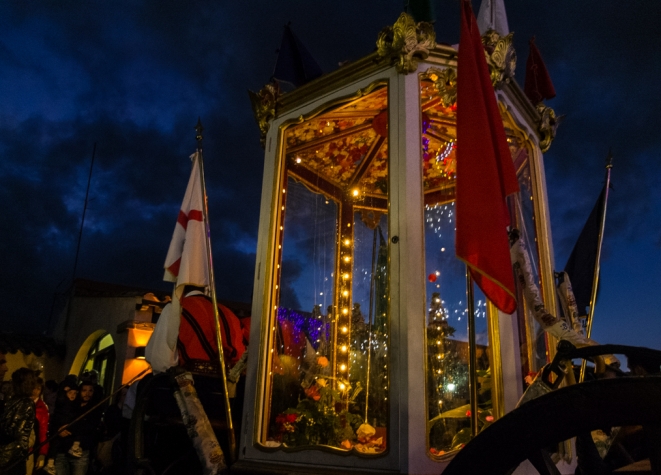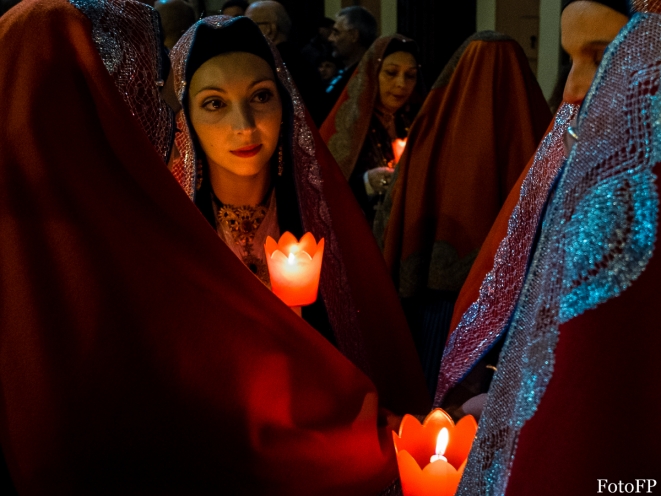The "goccius" of the glorious martyr Saint Efis
A Chanson de geste
In troubled and turbulent years, in which the Western Roman Empire was reeling under the blows of the barbarian invasions and was racked in power struggles, Christian monotheism was gaining followers and, despite persecution and cruelty to which converts were often subjected, following the moods and the taste for the spectacle of the Roman circus of the years after its dissolution.
And so, as happened to Saul of Tarsus, better known as Paul, persecutor of Christians, on the road to Damascus, even Efisio, put in charge of a Roman militia by Diocletian, ruthless enemy of Christians, more for boredom than conviction of their dangerousness, having fought and won the people of Barbagia (the center-east region of Sardinia), arrived in Cagliari, publicly denounces his conversion.
The narration of the priest Mauro (or Marco) in Passio Sancti Ephysii does not say much, except, on the model of martyrdom of saints, the last moments and miraculous reactions at the torture by Efisio which he attended as an eyewitness.
The cross marked on the right hand, as we see today in the statue - although there is that "sballìada" wrong, who reported it on the left - testifies a convinced change, declared to the saint's mother and the emperor, in short, a full-blown "outing".
Arrested and tried, he was sentenced to beheading. So to Nora, in 303 (or 313?), the sentence was carried out. Before he died, as he tells the priest Mauro to this prodigy, he addressed a prayer to God, recommending to have a special regard for the city of Cagliari and "And how many of them will suffer from some disease, if they come to the place where my body will be buried, to recover health or, otherwise, will close by the waves of the sea or be oppressed by barbarian peoples or will be ruined by famine or plagues, after praying me, your servant, be saved for You, Lord Jesus Christ, God Son, Light from Light, and are freed from their suffering."

A hero. A true knight announcing the virtues of those who, later, will enliven the chansons de geste, Roland first of all, died for treason in the fight against the Saracens and drawn by two archangels, Michael and Gabriel, to reach except in Heaven. Efisio is a defender of the weak, a protector of the oppressed, hit by extraordinary abilities. Just listen carefully to the beautiful text of the Goccius de su gloriosu martiri Sant’Efis to fill the gaps in history and learn about the life and deeds of the martyr Efisio.
The goccius or gosos, from Latin gaudium, are praises sung to the saint, high expression of devotion and emotionally compelling. The history of Efis goes like this. The testimonies of those who, every year, attending the singing, usually accompanied by launeddas, in the church dedicated to the Saint of Stampace, are troubled, full of sincere emotion. This is because on hearing the words of praise and prayer “Protettori poderosu, De Sardigna speziali, Liberainosì de mali EFIS Martiri gloriosu”(Powerful protector, special of Sardinia, free us of evils, EFIS glorious martyr) already it feels safe. The words "poderosu" strong, capable, and "gloriosu", in the glory of the Lord filled with his Spirit, encourage us, fill our hearts with hope. Because devotion to Efisio, this Asian came from Jerusalem, holy delicate-looking, with Spanish style mustaches and ringlets hair, advancing in a procession full of jewelry offered by the faithful dangling on his chest, attached to the clothes, the lace shirt and the red cape, is big, special, extraordinary, unique. And then the Gocciu tells what happened to him.
From birth to Elijah, "close to Antioch", up to thirty years, critical age as it was for Jesus of Nazareth. Arriving in Italy, in a place where they had camped the Christians, he heard for the first time about the God of Heaven. And here something extraordinary happens "Unu raju e Tronu spantosu" lightning and thunder scare and worry him. But not enough "A su Tronu, raju, and luxi Bieis in s'aria a Gruxi, E un'atera in sa manu" here is that the thunder and lightning to follow a light and Efisio sees a cross in the air. The Captain is always more thoughtful, stunned. But it recovers, although now the irreparable happened, he is now "Cristianu segretamenti" secretely cristian.
The adventure continues in Sardinia, on the other hand has received orders from Diocletian: the island have to be made safe, the "barbaricini" are rebels and also Arborea is no exception. Efisio does his duty. He is
“Capitanu giai valenti
De Deus cuntalisazionis
Suggettastisis Nazionis
De sa prus barbara genti:
E de inni gloriosamenti
A Casteddu vittoriosu”.

Its value is therefore indisputable, he wins over the barbarians and arrives, surrounded by the glory of his exploits, in Cagliari. But the city will be fatal to him. At the height of his happiness and his fervor for the new faith, that of the sweetness of love, the same for all, that of the resurrection of souls, Efisio announced his conversion to the Emperor.
And so his martyrdom begins. Arrested and imprisoned, an angel of Lord visits him in his cell and gives him the strength to withstand the torture: “A bastonadas is palas (…) nudu in mesu e sa genti (…) cun puntas de ferru callenti Os raschiat nerbius, e venas”. Beatings on his back, naked in the crowd who mocks him, tortured with red-hot iron, Efisio is thrown in prison.
He's dying. But the dark and fetid cave in which he languishes, becomes clear, as clear as the sky: the angel visits him again, comforts him with love and care. Seeing the next day that Efisio is healthy and doing well, his persecutor, Giuliu Prefettu, panicked. He escapes, full of fear. Efisio, in the depths of his unhealthy cell, however, will be haunted by the successor of Giuliu, Flavianu that inflicts the "setti turmentus Inumanus, and sangrientus Os cundannat po Cristianu" the seven inhuman tortures. And then the death sentence finally arrives. Efisio, a Christian who is not afraid to die, enrages Flavianu:
“Custu barbaru inflammau
A vista de tanta passienzia
Os fulminat sa sentenzia
D’essi in Nora degogliau:
E de su Xelu animau
Offreis su zugupreziosu.”
This angry barbaric, seeing a lot of patience, glares at the sentence to beheading.
Led to Nora, it is executed. But not afraid, neither Efisio is animated by hatred: he offers his neck to the Executioner with the desire to reach heaven.
The story told in Goccius, modulated with a steady and continuous rhythm, still moves the Sardinians who come from all over the island to Cagliari, the First of May, each year since that first time in 1656 when Efisio, faithful to the words spoken to the priest Mauro who picked him, as a brave knight, protector of truth and justice, freed from evil Sardinia. At that time it was the plague, then the French in 1793, and then the war, and then ...
Efisio, the patron of Cagliari, was buried on the place of his martyrdom, where a small church was built and donated subsequently to the Vittorini Monks of Marseilles in 1089. The bodies of Efisio and Potito, who was also a Christian martyr buried in the same church, were transferred in Pisa and laid in the cemetery where the life of Efisio was painted by Spinello Aretino.
The reason for the choice of Efisio, an Oriental, as preferred by the Sardinians, is a mystery. A mystery that is expressed with the same liturgy, equal and reassuring, every year. The Goccius de su gloriosu martiri Sant’Efis is the beautiful and adventurous story of a invincible hero, immortal, pure, coherent, who lived in idolatry and that the light of God has illuminated turning him into a witness of faith. If we had any doubts about immortality, Efisio assures us of the contrary. Hooray for Sant'Efis.